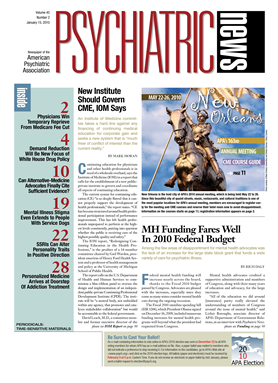As federal regulations begin to emerge that will implement a massive program to help fund adoption of health information technology, a leading standards group is developing a first-time certification for digital health records for mental health.
The federal government has made widespread health information technology (HIT) adoption by physicians a major policy priority, and a centerpiece of the initiative is a program to reimburse physicians for some of the cost of installing such programs, since cost is the most often-cited barrier.
Regulators were expected to issue the draft guidelines for implementing the reimbursement process by the end of 2009.
The regulations are critical because they will define which physicians can qualify for the federal HIT funds of up to $44,000 over five years—beginning in 2011—to defray their costs in installing electronic record systems.
Part of the regulations will require that physicians use a certified electronic medical record (EMR) system, which is a digital version of the patients' records. Regulators have not yet determined what entity will establish such certifications, but the only existing national certification program is moving forward with a detailed certification process of its own. Among the newest areas of medicine upon which that group has focused is mental health care.
The Certification Commission for Healthcare Information Technology (CCHIT), a nonprofit organization that certifies EMR systems, has been working with the health care industry—including physician groups—to develop HIT standards (Psychiatric News, January 5, 2007). The federal law establishing the HIT reimbursement program describes the CCHIT standards as a guide for future federal certification standards, which are due to be finalized by the end of this year. However, the final federal standards will not be constrained by CCHIT decisions.
The CCHIT convened a group of psychiatrists and mental health professionals to develop EMR standards that could be used by mental health clinicians who operate their own practices.
Currently, “when one is buying an [EMR system] one has no idea whether that [system] is going to help you manage your patient workflow,” said Steven Daviss, M.D., a psychiatrist and co-chair of CCHIT's Behavioral Health Work Group, which is developing the standards, in an interview with Psychiatric News.
Although experts in the field believe some solo-practice psychiatrists have added existing uncertified EMR systems, most psychiatrists who use such systems are likely part of large institutions because it is very costly to determine mental-health-specific requirements of an EMR without a certification process for such systems. Simply determining which vendor's EMR system will meet their mental health professionals' needs can cost institutions “tens of thousands of dollars,” said Daviss. Installation, data conversion, and training would cost many thousands more.
“Our aim was to reduce the risk of providers buying something that doesn't work for them,” said John Morrissey, communication manager at the CCHIT, in an interview with Psychiatric News.
Off to ‘Pretty Good’ Start
To that end, the CCHIT developed an initial draft of criteria for EMRs designed for behavioral/mental health services and opened it for public comment in November and December 2009.
Among those commenting were APA representatives, who looked to see how well the proposed certification criteria would serve psychiatrists.
“Overall, [the proposed standards] looked pretty good,” said Robert Plovnick, M.D., director of the Department of Quality Improvement and Psychiatric Services at APA, in an interview with Psychiatric News.
Plovnick praised the proposed standards for including prescribing functions but raised concerns about the lack of criteria for how EMR software would maintain therapy notes, as required by federal privacy law.
The development of a certification for EMR systems focused on mental health should help spur wider adoption of digital records by solo-practice psychiatrists, Plovnick said. However, other obstacles beyond the lack of certification remain, including the high cost of such programs.
Resistance Yet to Be Overcome
The push for broad physician adoption of HIT systems will have to overcome long-standing clinician resistance to them based on their cost and ability to protect the privacy of patient information.
Only about 12 percent of physicians have adopted HIT systems, according to a 2008 Congressional Budget Office report. Another study, published July 3, 2008, in the New England Journal of Medicine, found that only 4 percent of physicians had adopted fully functional EMRs, and those who had tended to be in larger practices (Psychiatric News, August 1, 2008).
The certification standards will continue to evolve based on the comments submitted to the CCHIT. Psychiatrists will have another opportunity to provide their views on the proposed standards when another public comment period is opened in February. Final standards are expected in June.
Sharon Hicks, M.S.W., co-chair of the CCHIT's Behavioral Health Work Group, urged psychiatrists to review each criterion in the context of their clinical work.
“This is the basis for something that will really grow to help” mental health practices, she told Psychiatric News.

